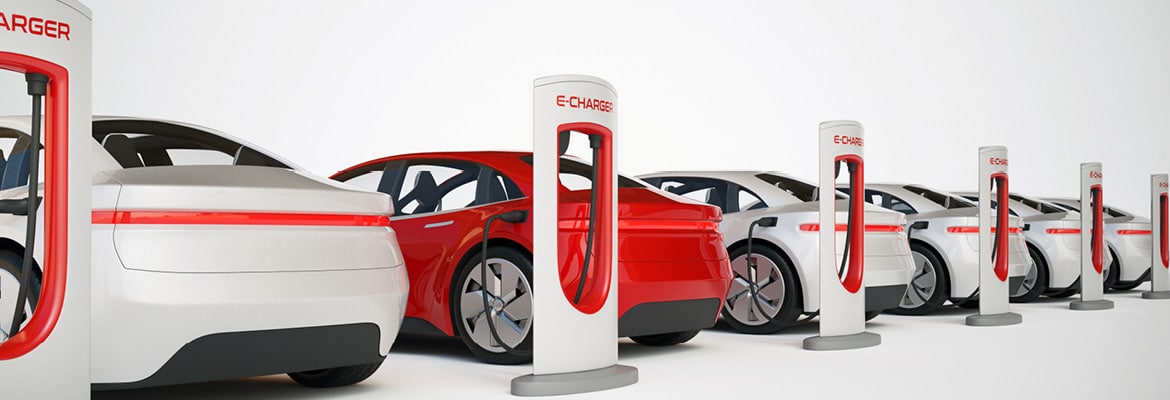Author(s)
From motorcycles to trucks, automakers are releasing innovative new electric vehicles, so it’s no surprise that consumer interest in EVs has been steady. This makes it more important than ever that dealerships understand their ideal EV buyer and how to make electric and hybrid car purchases appealing to them.
Are people buying new electric cars?
Customer demand for new EVs has slightly increased. This year, combined sales of hybrid, plug-in hybrid, and battery electric vehicles in the U.S. rose from 17.8% in the first quarter to 18.7% in the second quarter. Additionally, the U.S. Bureau of Labor Statistics projections say electric vehicles will make up nearly 40% of passenger car sales by 2030.
What about used EVs?
Much like new electric cars, interest in used EVs is steadily increasing. The used EV market is projected to grow at a CAGR of over 31% between 2024 and 2029.
Why do consumers want electric vehicles?
Let’s take a look at the reasons why people are transitioning to electric and hybrid cars. From the obvious savings in gasoline to being environmentally conscious, there are some factors that shoppers consider to be important for purchasing an EV.
Cost-effectiveness
While gas is convenient, especially for long-range travel, the cost of fuel adds up quickly, but charging an electric vehicle is much more affordable. Gasoline cost is a common pain point addressed by major EV manufacturers.
Driving an electric vehicle is much more cost-efficient than its counterpart. Data from AAA indicates that while a compact EV is a more expensive initial purchase, there are significant savings in fuel costs. After traveling 15,0000 miles in one year, they found the total cost to charge an EV runs roughly $546 per year, while a gas-powered vehicle can cost $1,255 annually.
Additionally, electric cars are known for their low maintenance costs. Drivers are no longer responsible for routine oil changes or spark plug and oil filter replacements. The annual cost for maintenance and repairs is approximately $350 for an electric car and $949 for a gas-powered vehicle.
Convenience
It’s not uncommon to find charging stations in store parking lots, providing owners an opportunity to power up their EVs while shopping at their local grocery or retail store. For example, some Costco, Ikea, and Target stores offer charging stations free to their customers, encouraging ease of shopping while they charge their electric cars. Additionally, EV owners can charge their vehicles overnight as most of them plug into a standard home outlet, depending on the plug type.
Federal tax credit
The Inflation Reduction Act provides a $7,500 federal tax credit for EV buyers who purchase a new all-electric or hybrid plugin car. However, this federal credit varies based on the capacity used to power the vehicle’s battery. In some cases, additional credits on a state or local level may apply.
Environmentally friendly
An obvious reason many drivers are drawn to electric vehicles is the impact they have on a greener world. EVs produce significantly lower amounts of greenhouse gas emissions and no tailpipe emissions, resulting in cleaner and healthier air.
Demographics of electric vehicle owners
You already know that understanding your customer is what leads to a successful transaction. Not everyone who visits your dealership is interested in an electric vehicle, but understanding who they are (do they match your buyer persona?) and their unique needs (are they looking for a practical way to save on gas?) will ensure you place them in a vehicle best suited for them. Let’s dive in deeper.
While there are several types of buyers, CleanTechnica says Gen Xers and Millennials buy the most electric vehicles, followed by Baby Boomers. In addition, electric cars appeal to younger, college-educated Americans who have higher incomes and live in urban areas.
Electric vehicle sales model
While electric cars are gaining popularity, OEMs continue to make moves to meet consumer demand, changing the EV business model. The top electric car manufacturers in the market right now include Ford and Tesla in addition to rapidly growing brands like Rivian and Lucid Motors.
With so many EV makers in the market, there are more choices available for consumers, including hatchbacks, SUVs, trucks, and more. Below are the top-selling electric cars in the United States:
- Tesla Model Y
- Tesla Model 3
- Chevrolet Bolt EV/EUV
- Ford Mustang Mach-E
- Volkswagen ID.4
- Hyundai Ioniq 5
Currently, dealerships are the primary way car buyers make a purchase. However, some manufacturers sell directly to consumers. This is nothing new in the EV market. In fact, Tesla uses dealerships as distribution centers where the manufacturer can ship the vehicle and the buyer can drive it off the lot. Due to rules and regulations in place in specific states, dealerships may be required to be involved in the process of buying and selling.
Public opinion on electric cars
While EVs are growing in popularity, PEW research indicates that about 3 in 10 Americans say they would seriously consider purchasing an electric vehicle. The report also showed that 56% of Americans are not too or not at all confident that the U.S. will build the necessary infrastructure to support large numbers of EVs. However, nearly half surveyed say that EVs are better for the environment than gas vehicles.
Common questions your EV shoppers may ask
While EVs continue growing in popularity, your customers may still have questions every dealer should be prepared to answer.
What is the battery range on an EV?
Battery ranges on EVs are continuously increasing, some up to 500 miles per charge. Electric vehicles like the Lucid Air can travel up to 410 miles when fully charged. This varies greatly depending on the EV make and model. These ranges can also be affected by outdoor temperatures. For example, extremely cold weather can reduce your travel distance by 20%.
Are they environmentally friendly?
While the manufacturing process may not be environmentally friendly, driving an EV is. One study found that the emissions produced by a small gas car exceed those from a small electric vehicle at around 21,300 miles, and larger EVs like crossovers and trucks exceed emissions at 17,500 miles.
How long does an EV battery last?
A healthy EV battery can last for up to 20 years, making it an excellent long-term investment. Additionally, every electric vehicle sold in the United States comes with a battery warranty that covers it for up to 8 years or 100,000 miles.
What is the EV tax credit?
The federal EV tax credit is an incentive that encourages electric vehicle purchases. Buyers can receive up to $7,500 for new EVs and $4,000 for used electric cars. The credit applies to both electric and hybrid vehicles. It is important to note that this is not a check, but an incentive customers can use on their taxes.
Are state incentives available?
Some states provide incentives to individuals who purchase EVs and businesses who invest in its infrastructure. For example, Illinois offers rebates between the amounts of $1,000 and $4,000 for EVs either leased or purchased in 2022 through 2028. From a business perspective, Georgia is investing in companies that lease or purchase electric vehicle supply equipment (EVSE) by offering an income tax credit of 10% or $2,500.
Not all states offer EV tax credits and rebates. Click here to learn more about which qualify.
What happens when I lose battery power?
“Range anxiety” is common in all EV drivers, but your electric vehicle will not run out of power without notifying you in advance. When your electric car begins to lose a charge, it will reduce propulsion power. Some vehicles even come with technology and a navigation system that notifies you of where the closest public charging station is and provides directions to the location.
What do all the EV acronyms mean?
- SOC: State of charge
- PHEV: Plug-in hybrid electrical vehicle
- CCS: Combined charging system
- EVSE: Electrical vehicle supply equipment
- CHAdeMO: Charge de move
- BEV: Battery electric vehicle
- ICE: Internal combustion engine
- kW: Kilowatt
- kWh: Kilowatt-hour
- Level 1: 120-volt AC charging
- Level 2: 240-volt AC charging
- Level 3: High power DC fast charging
- J1772: SAE standard for EV charging and the connector that all non-Tesla models use for Level 1 and Level 2 charging
- MRGe: Miles per gallon of gasoline equivalent
- Regenerative braking converts kinetic energy into electricity to slow the vehicle
Though it’s still a relatively small market, electric vehicle sales are on the rise. More and more people are buying EVs for a variety of reasons, including environmentalism and cost savings. As EVs continue to gain popularity, it’s critical that dealers understand their buyers to ramp up electric vehicle sales.

Electric car shipping is a click or call away
Sold a car to an out-of-market buyer? No problem. Montway Auto Transport has over 16 years of experience working with dealerships nationwide to safely transport electric cars from lot to driveway. Whether your customers are 20 miles or 2,000 miles away, carriers in our network specialize in both short and long-distance vehicle moves. Contact us today at 888-998-4161 or visit our website to learn more about how we serve dealers and dealer groups.








